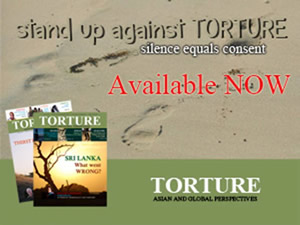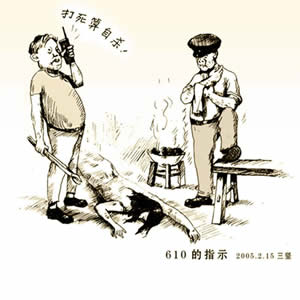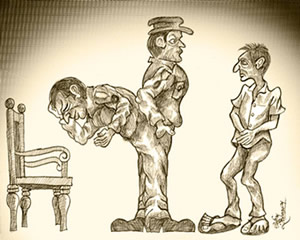
Ilankai Tamil Sangam
Association of Tamils of Sri Lanka in the USA
Published by Sangam.org
by Asian Human Rights Commission, Hong Kong, June 30, 2012
|
A question: why is torture endemic to the country, even after passage of many laws and the acceptance of numerous conventions against torture? The answer might appear to be a complicated one. However, we must remember that the occurrence of torture is neither accidental nor invisible to the public. It is the result of a long systematic process of social control, which uses old tactics of the powerful and unaccountable, without respect for past or present... What is being witnessed today in Sri Lanka is the collapse of basic institutions and citizens are forced to accept no-system as a system. The incumbent regime has been using cultural emotions to gain more power while sidelining the laws. Cultural dominance is a good way of understanding people's rights towards facilitating their own freedom. In the past, the royal absolute created huge distance between culture and the law. This was followed by a period that saw an overlap of cultural power with absolute power, resulting in isolation of the law. And, now, the gap between the highest practitioner of the law and the authority taken in the name of that law is itself the very foundation of dictatorship. .
|
PRESS RELEASE
Torture: Asian and Global Perspectives launched
The Asian Human Rights Commission wishes to inform that its new initiative, Torture: Asian and Global perspectives, was launched at an event that was jointly organized by the Asian Human Rights Commission and the Centre for Comparative and Public Law at the University of Hong Kong in the Foreign Correspondents' Club, on Monday, 25th June 2012.
The bi-monthly magazine aims to extensively cover aspects of torture not only in Asia but other parts of the world as well. Its first issue was mainly focused on India, the largest democratic nation in the World. The issue presented how torture still exists in the country and how human rights activists and others who are committed to protecting human rights can campaign against these abuses with non-violence.
Torture's ubiquity in Asia is such that it has become an integral part of the continent's everyday landscape. Torture is so 'normal' that governments are rarely held to account for practicing it, judicial systems are often lackadaisical in dealing with it, national media ignore it, and the public is indifferent to it. This insidious normalisation of an abhorrent practice is a colossal bar to combating torture in Asia, Tisaranee Gunasekara, who is a Sri Lankan columnist based in Colombo pointed this out in her comment in themagazine.
Meanwhile in his essay, Bob Brecher, Professor of Moral Philosophy at the University of Brighton, and author of "Torture and the Ticking Bomb", wrote an extensive analysis of torture in the present geopolitical situation. "Torture is the worst thing we do to each other. A torturous society -- the sort of society increasingly legitimized since September 2001 - is the worst society we can create; Why?"
In his essay, Sheikh Showkat Hussain, a professor who teaches human rights and international law at Kashmir University, examined torture against children in Kashmir, stating that the, "Indian Constitution does not have any specific provision which explicitly provides protection against torture," he observed.
 |
| The police radio blares, "If she dies due to the torture, just report it as suicide." - Cartoon Courtesy: Clearwisdom.net (Note: Because of the 610 Office's position, function and bloody crimes in persecuting Falun Gong, the international community calls it the "Chinese Gestapo.") |
Additionally, "It is not the duty of the citizen, nor is the citizen even able, to prevent torture or to create a genuine justice system. It is the singular responsibility of the state, which possesses the means and mandate to enforce the law" said Bijo Francies of the AHRC in an interview with the magazine.
In our second issue we focused on Sri Lanka and tried to deliver broader coverage on torture, which is part of daily life in the island nation. In this issue many scholars contributed with their specialized areas of expertise. "The majority of torture doesn't occur for political reasons. It more often takes place in order to conduct criminal investigations so in that process, instead of properly investigating a crime and using methods of investigations through the use of forensics and other methodologies, people are just beaten and forced to confess." said Basil Fernando, an icon of human rights actives and a director of the AHRC said in an interview.
In our editorial we tried to understand the problem and its root causes. One question we had was, "Why is torture endemic to the country, even after passage of many laws and the acceptance of numerous conventions against torture?" The answer might appear to be a complicated one. However, we must remember that the occurrence of torture is neither accidental nor invisible to the public.
It is the result of a long and systematic process of social control, which uses old tactics of the powerful and unaccountable, without respect for past or present. Sri Lanka is unable to develop a system through which not only would torture be eliminated, but all forms of crimes would reduce, to reflect the kind of evolved civilization that we claim we are. The sad part is that these primitive practices of torture are being used as tools of social control.
Even the electoral process has become cynically manipulated by those who appear to have absolute power; i.e. a site of hollow democracy where authentic dissent has little space to make its presence felt. It is perhaps naiveté on the part of the citizens that accept this space as one through which justice can be achieved and violence reduced. This acceptance has created tremendous stress and darkness in Sri Lankan society.
Today we are in a situation where we must find a way to break down the system of absolute executives, as we have for absolute monarchs in the past, and hold every citizen as equal before the law. Unfortunately, today's politics ignores the principles of a free and equitable society, in favor of popularity contests between special interest factions and the compromising of the rule of law. To find a way to achieve our goals is a long term process and an understanding of voluntarism is important. "Making a path for victims to come forward and express their experiences while continuing rational discourse is crucial to any serious return to a society that respects the rule of law," Nilantha Ilangamuwa, an editor of the magazine said. He added, "Generally, politics has more in common with culture than legality. Because of this an idea of "social change" came into discourse, where social movements originated."
We believed that, despite of all these facts, elimination torture is a collective process which will take a long time and tremendous effort to achieve. Torture: Asian and Global perspectives, is only one point on that long road and we hope to join hands with victims of torture and opinion makers to make our presence known to policy makers. We hope people all around the world will joined us to eliminate torture and ensure that a torture free society is possible.
Volume One-Issue Two
EDITORIAL: SRI LANKA: What went wrong?
Torture is a crime. And, this criminal activity, in all its cruel, inhuman, and degrading reality has been increasing in Sri Lanka. This is so, even after the end of the civil war between the State and the Liberation Tigers of Tamil Eelam (LTTE).
There is evidence that various forms of torture existed in the history of the island nation. During the long periods of 'Royal Absolute', torture was a tactic used by the authorities to impose and maintain order. In fact, a whopping 32 types of torture methods were used categorically to punish suspects in front of the public. As one of our contributors has presented here, these torture methods included being trampled by an elephant and being impaled on a pointed iron pole. The prosecution process in the country was thus rather violent and primitive until 1815, when British colonialists introduced a law against the practice of torture.
In the last hundred years, many laws have been passed and many international conventions have been signed by the government on behalf of the State in acceptance of the prohibition of torture. But torture continues to be practiced widely in Sri Lanka, even today.
Illustration by Indika Dissanayake |
CONTENTS
EDITORIAL: WHAT WENT WRONG?
YOU CAN'T HAVE BAD GOVERNMENT AND TORTURE FREE SOCIETY - BASIL FERNANDO
ANALYSIS: POLITICS OF TORTURE AND TERROR IN SRI LANKA -- DR. LAKSIRI FERNANDO
STUDY: PSYCHOLOGICAL CONSEQUENCES OF TORTURE IN SRI LANKA -- DR. DAYA SOMASUNDARAM
OPINION: UNCAT SRI LANKA EXPERIENCE -- DR. SERGEY GOLUBOK
ESSAY: HISTORY OF TORTURE IN SRI LANKA -- DR. UCP PERERA
VIEWPOINT: TORTURE ON SUSPECTS -- DR. THRISHANTHA NANAYAKKARA
Click here to subscribe to Torture: Asian and Global Perspectives
The Asian Human Rights Commission (AHRC) has documented more than a thousand cases of torture in Sri Lanka, and it has summarized over 400 police torture cases during the last couple of decades. Most police personnel in Sri Lanka remain ignorant of basic principles and ethics that they are expected to know, and required to practice, in implementing law and fulfilling duty. The consequence is merciless use of old torture practices in various new forms.
Most police stations in the country have become torture chambers. Here 'suspects' get severely tortured from time to time and deaths in custody are only occasionally reported. Many citizens of Sri Lanka have become victim to these ruthless practices. To our knowledge, such torture is not limited to police stations, but is entrenched in some prisons as well.
In the last week of May, 2012, the US State department issued its critical annual human rights report, which has highlighted existing methods of torture in Sri Lanka. "Former TID (Terrorism Investigation Division) detainees at Boosa Prison in Galle confirmed reports of torture methods used there. These included beatings, often with cricket bats, iron bars, or rubber hoses filled with sand; electric shock; suspending individuals by the wrists or feet in contorted positions; abrading knees across rough cement; burning with metal objects and cigarettes; genital abuse; blows to the ears; asphyxiation with plastic bags containing chili pepper mixed with gasoline; and near-drowning. Detainees reported broken bones and other serious injuries as a result of mistreatment," stated the report.
There have also been frequent media reports over the last few years - about the widely practiced method of white-van abductions, which have given the public much cause for fear and anxiety. The feeling is termed 'the white van syndrome.' It has been reported from Sri Lanka that there are genuine concerns that it is the government that has been involved in some of the abductions.
The widow of one such abductee has revealed details of her experience, which confirm the prevalence of brutal torture in the country. The case, in summary, goes like this:
Mr. Mohamed Sali Mohamed Niyas, also known as "LokuSeeya", was abducted in a Colombo suburb by an armed gang in a white van, and then taken to an unknown location in the Eastern province, where it is believed he was tortured, killed, and his body dumped into the sea. An apt question is how such an abduction can occur, considering that it involves taking a victim hundred kilometers away from the site of abduction and that the abducting gang would have had to go through at least 5 major security checkpoints. According to the postmortem, LokuSeeya was strangled and his throat slit. Injuries show that he was pounded and pummeled on the head and stabbed a number of times. He was also administered 3 injections of unknown chemicals. His body was found strapped with over 100 kg of weight and bound with barbed wire. That is not all. The body was further covered with polythene and bound some more with chicken fencing (similar to barbed wire). There also appeared to be something like an anchor attached to the body. In spite of all this weight, LokuSeeya's body washed ashore at Akkaraipaththu. From here, it was flown back home for funeral proceedings.
A question: why is torture endemic to the country, even after passage of many laws and the acceptance of numerous conventions against torture? The answer might appear to be a complicated one. However, we must remember that the occurrence of torture is neither accidental nor invisible to the public. It is the result of a long systematic process of social control, which uses old tactics of the powerful and unaccountable, without respect for past or present.
Sri Lanka is unable to develop a system through which not only would torture be eliminated, but all forms of crimes would reduce, to reflect the kind of evolved civilization that we claim we are. The sad part is that these primitive practices of torture are being used as tools of social control. Even the electoral process has become cynical manipulation by those who appear to have absolute power; i.e. a site of hollow democracy where authentic dissent has little space to make its presence felt. It is perhaps naiveté on the part of the citizens that accept this space as one through which justice can be achieved and violence reduced. This acceptance has created tremendous stress and darkness in Sri Lankan society. What is being witnessed today in Sri Lanka is the collapse of basic institutions and citizens are forced to accept no-system as a system.
The incumbent regime has been using cultural emotions to gain more power while sidelining the laws. Cultural dominance is a good way of understanding people's rights towards facilitating their own freedom. In the past, the royal absolute created huge distance between culture and the law. This was followed by a period that saw an overlap of cultural power with absolute power, resulting in isolation of the law. And, now, the gap between the highest practitioner of the law and the authority taken in the name of that law is itself the very foundation of dictatorship. To most citizens, the law was a stranger and did not directly cause any harm. But, those who have been allowed to abuse power in the name of law, have became the root cause of so many problems in our society.
Unlike most other countries, Sri Lanka has witnessed systematic and active elimination of dissent. This began occurring when a law, claimed to be of superior value, was introduced into society. This significant and horrendous event began with the introduction of new constitution in 1978, which made the executive presidential system official. It is unfortunate that there were no statesmen at the time willing to abolish this unquestionable, unethical, and irresponsible system. Today, there are in fact many who are gaining more powers by tom-tomming the benefits of the same. And, even more harmful than this act of sheer political vandalism is the September 2010 amendment, i.e. the 18th amendment to the Constitution. It has damaged hope for political reform, essential to reconstruct any broken system.
We have been going wrong in the last few decades; many political proposals have reached the legal level with lots of loopholes that have only aided the escape of the real culprits. Destruction of policing did not happen through isolated incidents, but collective efforts of the absolute power for many years. We cannot blame police officers for their becoming tools of the custodians of power in order to earn their living. In other words, destruction of morality and of the genuine policing system is not the actual disease but only a symptom. The solution or the process to find a solution needs to start at the root. Without deep feeling for, and/or genuine commitment to high level of justice, claims of reform in state institutions are a farce.
What is visible before us today is only our own fallacious rhetoric:
"It would not be the same here; here such things are impossible."
© 1996-2025 Ilankai Tamil Sangam, USA, Inc.